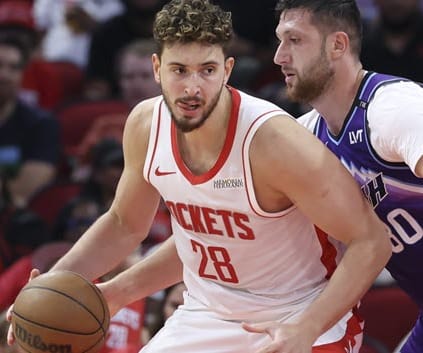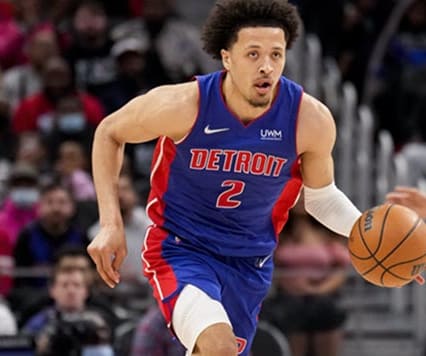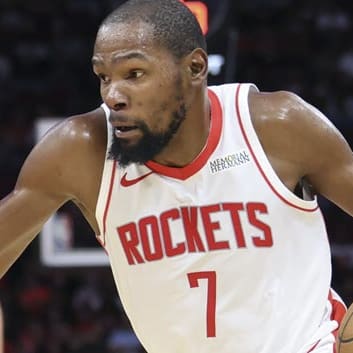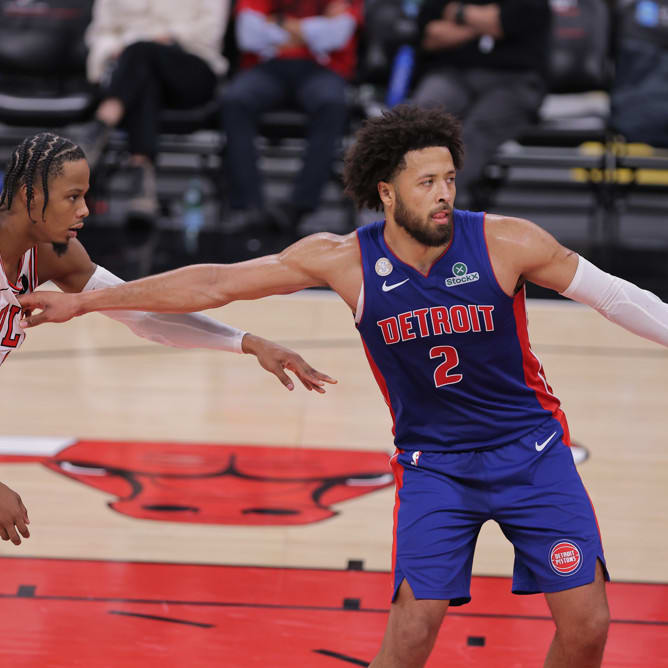Out
Injury Ankle
Est. Return 1/15/2026
2025 Stats
PTS
2.8
REB
2.9
AST
0.6
STL
0.2
BLK
0.2
ROS Projections
2025 Fantasy Outlook
Finney-Smith began the season in Brooklyn, where he was a prominent part of the offense and defense, playing 29.0 minutes per contest. A mid-season trade to the Lakers didn't impact his workload much, but his overall production and usage dipped. Altogether, he averaged 8.7 points, 3.9 rebounds, 1.4 assists, 0.9 steals and 2.0 three-pointers in 28.9 minutes while shooting a career-high 41.1 percent from long range in 63 regular-season appearances. Although the Lakers had interest in his return, the Rockets acted quickly in free agency, securing him to a four-year, $53 million contract. While this undoubtedly bolsters Houston's frontcourt, it's not a great move for Finney-Smith's fantasy appeal. The Rockets just acquired Kevin Durant from the Suns, and they have a plethora of exciting young forwards in Amen Thompson, Jabari Smith and Tari Eason. They aren't exactly built to play small either, as the team has a center rotation of Alperen Sengun, Clint Capela and Steven Adams. There's no question that Finney-Smith will have a role, but it's hard to imagine him getting a large enough piece of the offensive pie to impact standard leagues consistently. Finney-Smith underwent surgery on his left ankle in mid-June. He was initially expected to be ready for training camp, but the veteran sat out preseason action and is now unlikely to make his Houston debut on Opening Night. Read Past Outlooks

Sitting out vs. Bulls
Finney-Smith is out for Tuesday's game against the Bulls due to left ankle injury management.
ANALYSIS
Finney-Smith missed the onset of the season due to offseason left ankle surgery, and the Rockets are giving him Tuesday night off. Thursday's matchup against the Thunder is his next chance to suit up. His absence should allow Aaron Holiday and Josh Okogie to see an uptick in playing time off the bench Tuesday.
Finney-Smith missed the onset of the season due to offseason left ankle surgery, and the Rockets are giving him Tuesday night off. Thursday's matchup against the Thunder is his next chance to suit up. His absence should allow Aaron Holiday and Josh Okogie to see an uptick in playing time off the bench Tuesday.
NBA Per Game Stats
Per Game
Total
Per 36
NBA Per Game Stats
Loading Per Game Stats...
2025 NBA Game Log
2025
2024
2023
2022
2021
2020
2019
2018
2017
2016
2025 NBA Per Game Split Stats
Schedule
By Month
Starting/Off Bench
Days Rest
Vs Opp
By Result
2025 NBA Per Game Split Stats
Loading Split Stats...
Advanced Stats
Loading Advanced Stats...
Stat Review
2025
2024
2023
2022
2021
2020
2019
2018
2017
2016
How does Dorian Finney-Smith compare to other players?
This section compares his stats with all players from the previous three seasons (minimum 200 minutes played)*. The bar represents the player's percentile rank. For example, if the bar is halfway across, then the player falls into the 50th percentile for that stat and it would be considered average.
True Shooting %
39.2%
Effective Field Goal %
37.1%
3-Point Attempt Rate
83.9%
Free Throw Rate
6.5%
Offensive Rebound %
8.9%
Defensive Rebound %
12.1%
Total Rebound %
10.5%
Assist %
4.3%
Steal %
0.6%
Block %
1.3%
Turnover %
14.0%
Usage %
11.3%
Fantasy Points Per Game
7.7
Fantasy Points Per Minute
0.5
NBA Historical Fantasy Stats
Historical ADP
Loading Historical ADP...
Rockets Depth Chart
Our full team depth charts are reserved for RotoWire subscribers.
Subscribe Now
Rockets Rotation: Minutes Breakdown
Loading Rockets Rotation Data...
Average Fantasy Points
Minutes
FanDuel
DraftKings
Yahoo
FantasyDraft
Head2Head
Sorare
Average Fantasy Points are determined when Dorian Finney-Smith was active vs. non-active during the season. Click here to view average fantasy points for a different time period.
Loading Average Minutes...
Past Fantasy Outlooks
2024
2023
2022
2021
2020
2019
2018
2017
2016
Despite continuing to play a significant role for the Nets, Finney-Smith's numbers tell a different story. He played 68 games during the 2023-24 season, averaging 8.5 points, 4.7 rebounds, 1.6 assists, 1.7 three-pointers and 1.4 combined steals and blocks in 28.4 minutes per game. Although his contributions are consistent, they make for unexciting reading. Heading into the 2024-25 season, Finney-Smith is penciled into a starting role on a team that could very well end up at the bottom of the standings. While he could play meaningful minutes right out of the gate, there is a chance his role is scaled back as the season progresses. Brooklyn would ideally love to get a look at some of its fringe talent such as Noah Clowney, Day'Ron Sharpe and Jalen Wilson. Finney-Smith could have some early-season streaming value for anyone seeking an injection of three-pointers. However, that seems like a best-case scenario, and managers are likely to be able to find someone with at least a small amount of upside on most waiver wires.
More Fantasy News

Another quiet outing
Finney-Smith supplied three points (1-7 FG, 1-7 3Pt), three rebounds and one assist across 18 minutes during Friday's 111-105 loss to the Trail Blazers.
ANALYSIS
Subscribe now to instantly reveal our take on this news.
Subscribe now to instantly reveal our take on this news.

Scoreless in 15 minutes
Finney-Smith notched zero points (0-2 FG, 0-1 3Pt), three rebounds, one assist and one steal over 15 minutes during Thursday's 120-96 win over Brooklyn.
ANALYSIS
Subscribe now to instantly reveal our take on this news.
Subscribe now to instantly reveal our take on this news.

Little output in team debut
Finney-Smith (ankle) was held scoreless (0-1 FG, 0-1 3Pt) and committed a foul in 13 minutes during Thursday's 119-96 win over the Lakers.
ANALYSIS
Subscribe now to instantly reveal our take on this news.
Subscribe now to instantly reveal our take on this news.

Cleared for team debut
Finney-Smith (ankle) is available for Thursday's game against the Lakers, Shams Charania of ESPN reports.
ANALYSIS
Subscribe now to instantly reveal our take on this news.
Subscribe now to instantly reveal our take on this news.

Chance to return Christmas Day
Finney-Smith (ankle) is listed as questionable for Thursday's game against the Lakers.
ANALYSIS
Subscribe now to instantly reveal our take on this news.
Subscribe now to instantly reveal our take on this news.
Latest Fantasy Rumors

Could make Houston debut on Xmas
Finney-Smith, who's dealing with an ankle injury, could make his Rockets debut against the Lakers on Thursday, according to RealGM.
ANALYSIS
Finney-Smith is listed as questionable for Thursday's game, and if he does suit up, it would be his debut against his former team. The 32-year-old spent the second half of the 2024-25 season with the Lakers after being traded from the Nets to Los Angeles, but he left the Lakers during the summer in free agency to sign a four-year, $53 million contract with Houston. Adding Finney-Smith to the rotation would improve the Rockets' defense considerably.
Finney-Smith is listed as questionable for Thursday's game, and if he does suit up, it would be his debut against his former team. The 32-year-old spent the second half of the 2024-25 season with the Lakers after being traded from the Nets to Los Angeles, but he left the Lakers during the summer in free agency to sign a four-year, $53 million contract with Houston. Adding Finney-Smith to the rotation would improve the Rockets' defense considerably.














